'This is just unprecedented': Puppy boom, staff shortages press South Shore veterinarians
HINGHAM – Veterinarian Lisa Kimball said something happened last week that she'd never seen before.
The VCA South Shore Animal Hospital sent a fax to the Old Derby Animal Hospital in Hingham, where she works, with a simple message: Don't send us any more animals today. We can't take emergency visits.
"That's never happened," Kimball said.
And it's not just the VCA. Thousands of South Shore residents became pet owners for the first time amid the pandemic, and local vet clinics are feeling the strain. Appointments at some are booking more than a month out as veterinarians and technicians – who are not immune to the staffing shortage hitting industries nationwide – struggle to keep up.
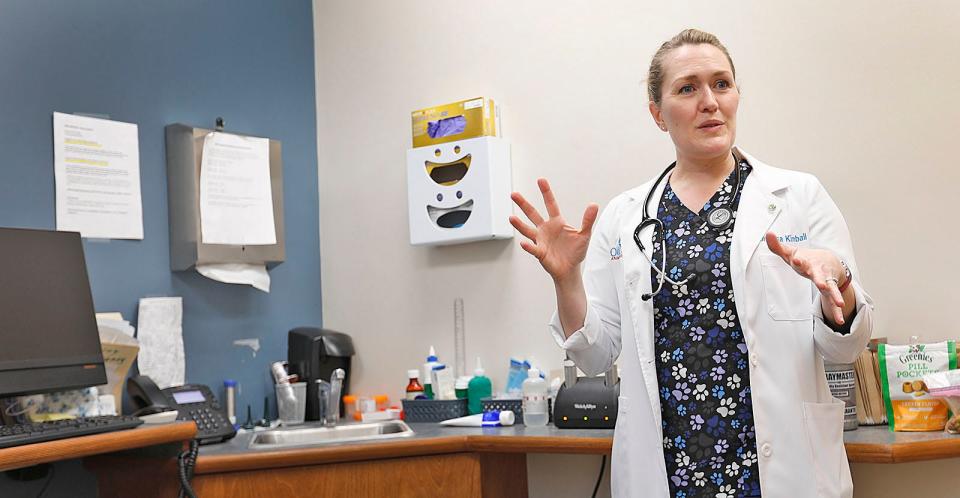
Kimball said she is grateful for how Old Derby has handled the strain, but still, vet clinics are feeling the weight of demand for their services.
A season full of surprises: South Shore High School Boys Basketball Top 10 Rankings
In Braintree: Construction projects like new middle school have a new financial watchdog
"We're going to feel this for many years to come," she said.
Vet appointments delayed, waitlists grow
You don't have to be a veterinarian to see the strain that the puppy boom put on clinics and animal hospitals.
Massachusetts Veterinary Medical Association President-elect Dr. Monica Mansfield said the demand has pushed some appointments weeks later than they normally would be. Regular wellness checkups may take longer to schedule and clients might be put on ever-growing waitlists as vet clinics try to make sure they have enough time each day to also see emergency visits.
"We are absolutely bending over backwards and standing on our heads" to get every patient in," Mansfield said. "Non-urgent things, in many cases, are pushed out many days."
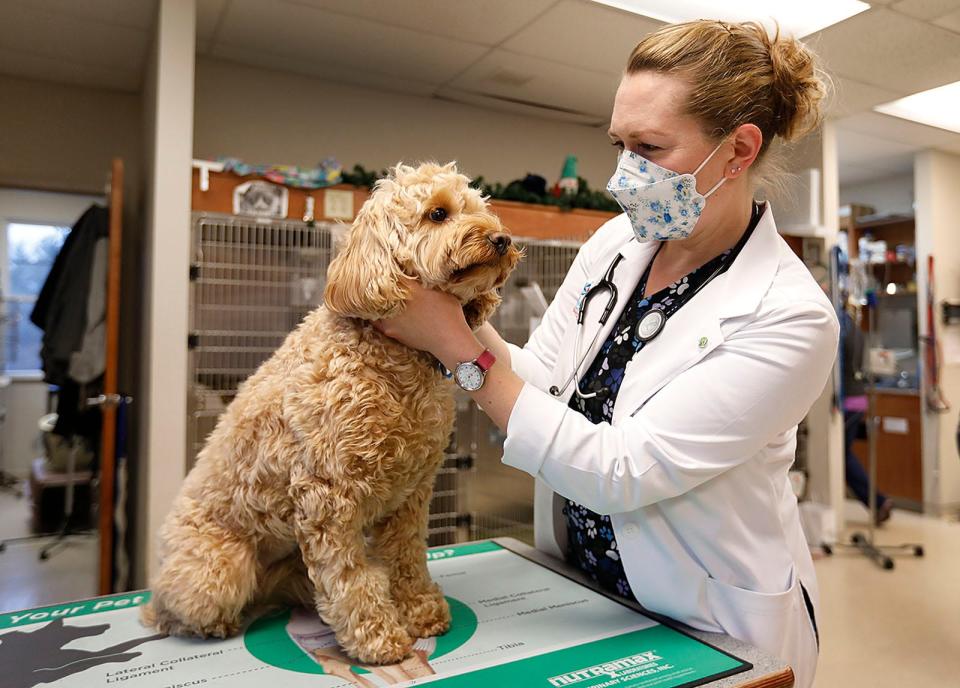
Animal hospitals, which handle emergencies and do surgeries in some cases, are feeling the squeeze too. The hospitals were busy at the beginning of the pandemic as clients brought their pets in for routine services such as ear infection treatments, which would otherwise be handled by local clinics.
Hospitals started using a triage system, prioritizing emergencies over routine services. Kimball said she knew that, on some days, clients sat in hospital parking lots with their animals for up to 10 hours waiting to be seen.
At many vet clinics, pets whose cases don't rise to the level of an emergency can be placed on a standby list and have to wait. On a recent Monday, Kimball's standby list had only two patients, which she called "a good day" compared to some days when that number swells to 10.
Addiction: South Shore to get $7 million of state's potential $537 million opioid settlement
"Don't send us anything," Kimball said, paraphrasing the fax Old Derby received. "We cannot, cannot do it. And that would be like the equivalent of like our South Shore Hospital being like, 'No emergencies, your (general practitioner) is going to have to see you if you fell out of a tree and you have a broken leg.' "
Demand on vet clinics grew gradually
The veterinary crunch didn't start immediately when the pandemic began, said Kimball, who also serves on the Massachusetts Veterinary Medical Association board.
At first, clinics saw a pause on many of their services. The world didn't know what kind of medical supplies might become immediately necessary for people, so animal caregivers diverted their services to reserve materials for human patients, she said.
"We weren't sure what was going to need to happen in the next few months," Kimball said. "We just knew that there was a crisis. So it was like, conserve, conserve conserve."
Banh mi in Braintree: Vietnamese sandwiches stuffed with all the fixings at new eatery
'True hall-of-famer': Cerebral palsy never slowed down North Quincy's Mike Leith on the court
At the same time, the pandemic was – and still is – making life difficult for caregivers, especially working mothers. Veterinary clinics, which Kimball called an "industry of women," had some doctors cut down their days in the office. Working from home where possible became the new norm, and the new necessity for many.
Kimball and her husband, who also works at Old Derby in Hingham, pared their days of working in the office when their children started remote learning, readjusting to the new "work from home" lifestyle.
It was in the spring of 2021, one year after the pandemic began, that the puppy boom started.
"It has not really slowed down," Kimball said. "Maybe a little bit, but we're still seeing a whole lot of puppies, like more puppies than we've ever seen. I've been a vet for 16 years, and this is just unprecedented."
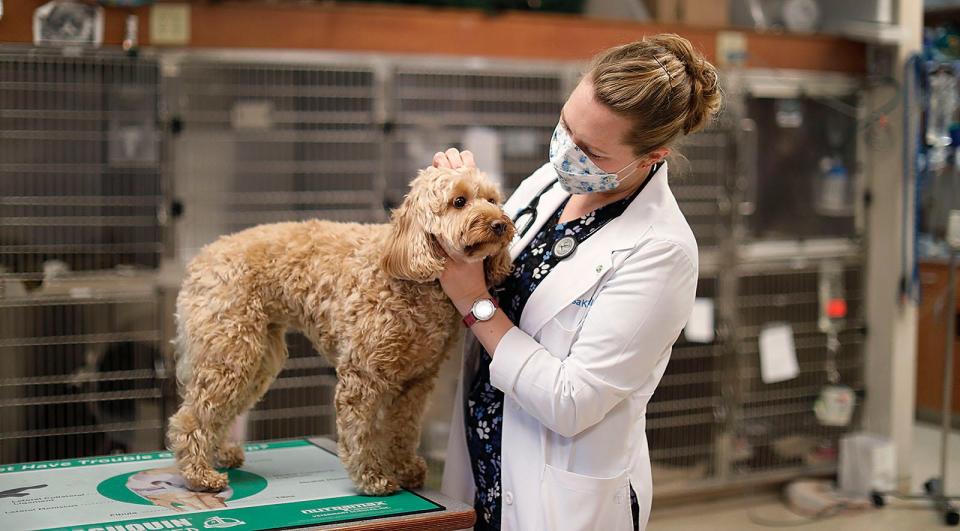
Puppy ownership soars amid pandemic
The ASPCA said close to one in five households – about 23 million nationwide – have adopted or purchased a new a cat or dog since the beginning of the COVID pandemic. The vast majority of those pets – 85 to 90% – have not been surrendered despite initial fears from some local animal shelters, and their owners are instead seeking veterinary care for their new furry friends.
With a new puppy comes new responsibilities, medical needs and wellness checkups, which soon overwhelmed the industry. Vets have been switching between in-person and curbside services as state mandates change, delivering diagnoses to clients either in exam rooms or via phone to pet parents sitting outside in their cars.
Curbside services gave vet clinics the ability to continue working, but Kimball said talking with clients in the exam room with the pet can be beneficial.
"Everything just works more smoothly when we're in person," she said.
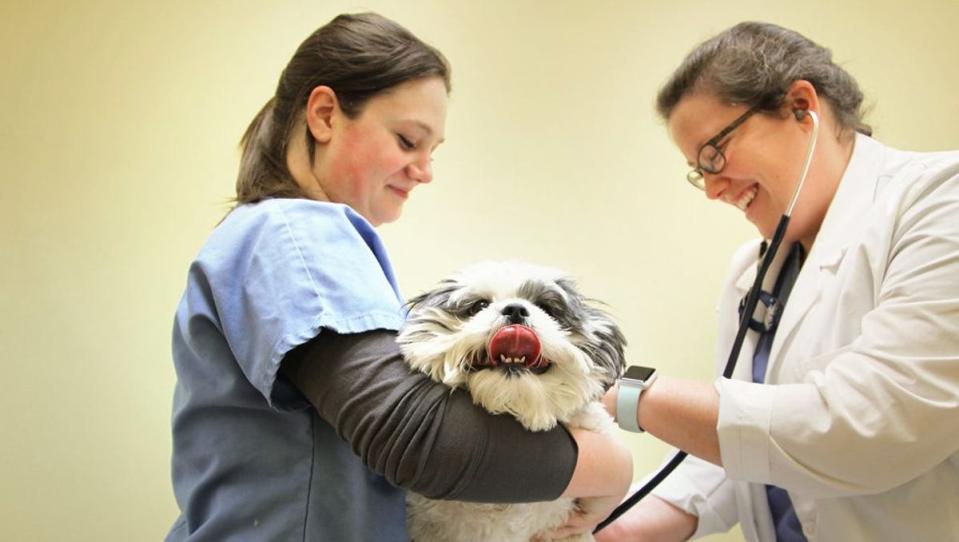
Shortage of staff leads to burnout among vets, technicians
The demand for veterinary services is undercut, Kimball and Mansfield agreed, by the staffing shortages that have hit vets as much as other industries.
Veterinarians and their coworkers are calling out sick or are having to quarantine due to COVID exposure, cutting down the number of available doctors in busy clinics. When someone calls out, other vets step up to take more appointments, which Mansfield said isn't sustainable in the long run.
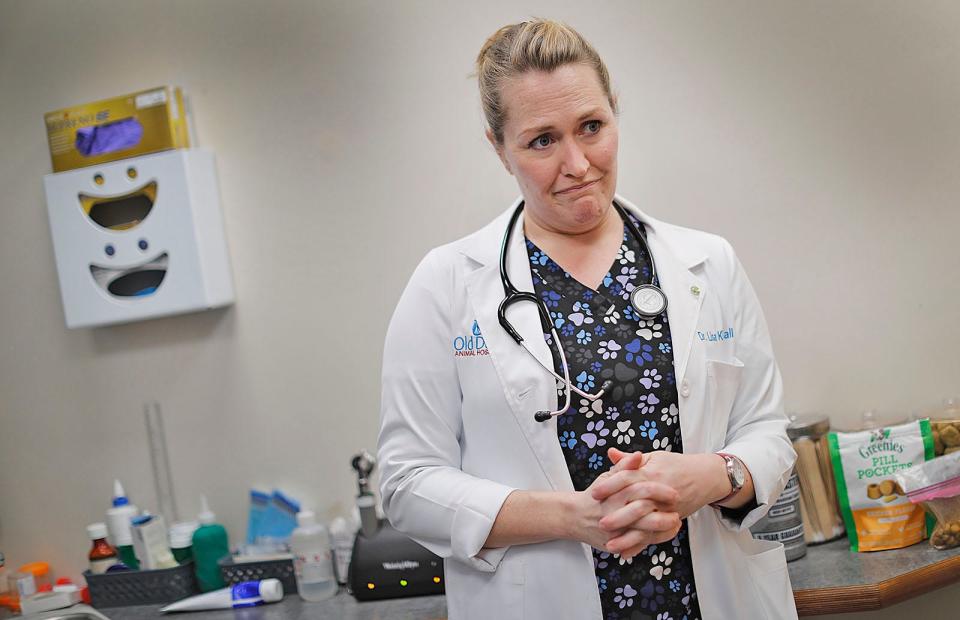
"We have to know where we can push ourselves," she said, but with the caveat of knowing when to pause to avoid burnout. "There's a lot of pressure on the staff."
She compared the workload of veterinarians to Sisyphus, the ancient Greek mythological legend. He was cursed to push a heavy boulder to the top of a mountain every day for eternity, only to watch it fall back to the mountain's base each night.
No matter how many clients veterinarians see, there are still more to go.
A lifeline: Animal Samaritans offers a safety net for those struggling to pay for veterinary care
Nationwide: You may have to wait longer for a vet appointment during the pandemic. Here's why.
Anecdotal surveys of Massachusetts Veterinary Medical Association members show that about 80% of respondents said they felt a slight or dramatic increase in both caseloads and stress in the last 18 months, executive director Jamie Falzone said. Like other industries during the pandemic, some veterinarians in the state are leaving the industry to find work elsewhere, Kimball said.
"We're stretched so thin in terms of trying to reach, do our normal jobs and our normal excellent care," she said. "We can't, I can't, the profession can't, be all things to all people at all times. ... I try to find comfort that I'm still able to reach families and animals."
Thanks to our subscribers, who help make this coverage possible. If you are not a subscriber, please consider supporting quality local journalism with a Patriot Ledger subscription. Here is our latest offer.
Reach Alex Weliever at aweliever@patriotledger.com.
This article originally appeared on The Patriot Ledger: Puppy boom, staff shortages press South Shore veterinarians

